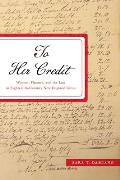“Stories of women hatching financial plans”
Sara T. Damiano, author of the new book To Her Credit: Women, Finance, and the Law in Eighteenth-Century New England Cities, shared some reflections on her research on the Johns Hopkins University Press blog:
In places like colonial Boston, MA and Newport, RI, economic networks hinged on personal borrowing and lending, and the county courts were a key arena for enforcing financial obligations. Among the hundreds of cases handled per quarterly or semi-annual term, more than three-quarters concerned debts. The vast majority of these were routine and uncontested. In such debt suits, lawyers and court clerks tracked financial obligations and legal actions, and so they largely produced skeletal, formulaic records. During my earliest forays into historical research, I breezed past these debt suits. I looked instead for the rare bulging files that, I then thought, yielded more interesting stories.The bulging files could shed light on what had probably happened before all the routine cases, Damiano reasoned.
Over time, I became more curious about what I and other historians meant when, echoing the language of our sources, we used seemingly straightforward verbs. How, precisely, did one go about collecting a debt in early America? What were the practical mechanics of paying one’s creditor? How did one sue or respond to a lawsuit? And, if I attended to the eighteenth-century people who in fact carried out these activities, how could that change our understanding of early America? . . .
Over time, I realized that terse, legalistic phrases bespoke complex negotiations occurring outside the courtroom. Creditors’ legal filings, for example, consistently noted that they had “often requested” payment, and that debtors had “always refused” to settle. Drafted by lawyers, such phrasing established debtors’ failure to meet their contractual obligations. Yet, once I began linking such language to details from other, well-documented lawsuits, I began to view these ubiquitous phrases as windows onto women’s extensive labor outside of court.
Behind lawyers’ insistence that creditors had “often requested” payment lay stories of women hatching financial plans, travelling through their communities and regions, and confronting others. One of these women was Margaret Fuller, an unmarried woman from Providence, Rhode Island. In February of 1730, Fuller loaned the moderate sum of six pounds to a Newport mason, Thomas Howes.Damiano also argues that women, while a small fraction (10%) of the litigants in debt suits, represented a larger portion of the commercial economy. Read the whole essay here.
Howes’s debt came due in May of 1730, and Fuller took an overnight trip to collect. She hired a boatman to carry her down the Providence River and across Narragansett Bay. Upon arriving in Newport, Fuller demanded payment from Howes. Lacking cash, Howes offered a barrel of sugar, which Fuller accepted. She and her boatman picked up the barrel from a tavern the following day.
While in Newport, Fuller travelled the city on foot, making several social and business calls. During each, she informed other men and women of her arrangement with Howes. When Fuller later decided that the sugar was insufficient payment and sued Howes, these Newport residents testified about her activities.


No comments:
Post a Comment